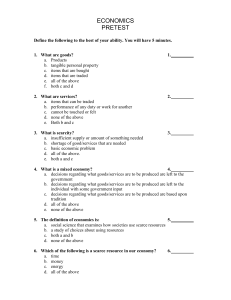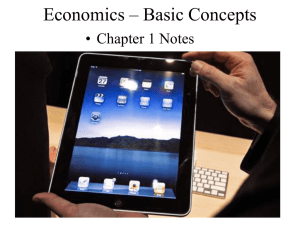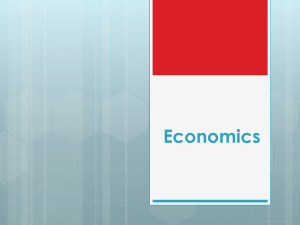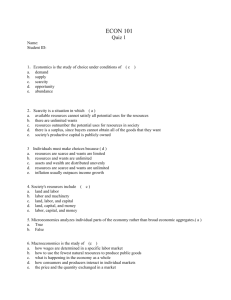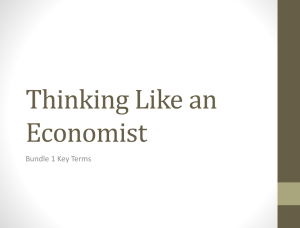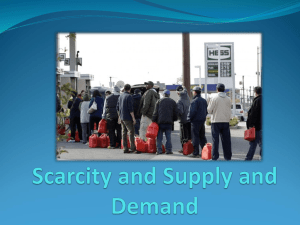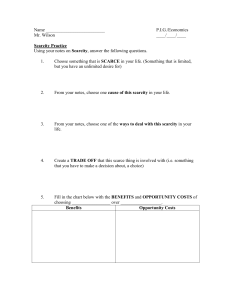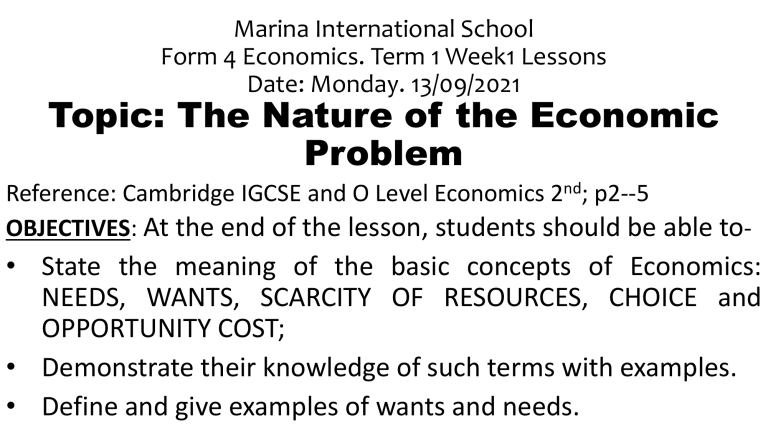
Marina International School Form 4 Economics. Term 1 Week1 Lessons Date: Monday. 13/09/2021 Topic: The Nature of the Economic Problem Reference: Cambridge IGCSE and O Level Economics 2nd; p2--5 OBJECTIVES: At the end of the lesson, students should be able to- • State the meaning of the basic concepts of Economics: NEEDS, WANTS, SCARCITY OF RESOURCES, CHOICE and OPPORTUNITY COST; • Demonstrate their knowledge of such terms with examples. • Define and give examples of wants and needs. PROCEDURE/METHOD Step 1: Introduction: PREVIOUS KNOWLEDGE Students can state that they have selected, opted, decided to do Economics at the IGCSE level in the year 2023. In choosing to do Economics, there is another subject which they cannot do at the same time. Again, they can also state that they cannot be a medical doctor and at the same time work as a lawyer. • Or even as they are watching video games and listening to the Economics teacher at the same time. • So, I just want to inform you that all we do in life is to make one choice or another from morning to evening. We can choose to wake up very early in the morning, or sleep late in the evening. • Life is full of infinite choices NEED • At this point, let us start with a few words which we will be using as Economics students. Two such words or concepts are NEED, and WANT. • NEED: A need is anything which we must use or do in our life otherwise life will be very difficult, and sometimes completely impossible. • There are three basic needs that all human beings use in order to continue in life: food, clothing, shelter/housing. WANTS • Wants are those things that give satisfaction, joy or pleasure when we use them even though we may not necessarily need them. Examples of wants are buffets, designer wears, luxury cars, ice-cream, biscuits. • Our needs and wants can also be called goods and services. UNLIMITED WANTS • However, there is something strange about the human being: S/he is never satisfied with what s/he has. So, we say in Economics that human wants are unlimited-------we have infinite needs and wants. This means that whenever one need/want is satisfied, then another one comes up; and until we get this latter one, life appears to be unbearable. (We always want more of what we already have, or we want a newer or larger version of what we have.) RESOURCES • Another key word in Economics is RESOURCES: those things that are used to make goods and services. To make “Super Kanja”, we use some cups of rice, okra & other vegetables, cat fish, water, salt, cooking oil, gas and stove, cooking utensils. We will call all these things we bring together to help get our “Super Kanja” as resources. • Learning/studying may require teachers, textbooks, exercise books, table and chair, a white-board, computer, internet etc • Everything we make requires the use of resources. Common examples of resources are workers, petroleum, machines, and roads. • Resources can also be called Factors of production, means, or inputs. Scarcity of Resources & the Basic Economic Problem • The word scarce refers to “not enough in quantity”, not enough of something; or to run out or almost out of something. • All over the world, Resources are said to be scarce in supply; this means that there are not enough resources to make or produce all the goods and services that we want. • (Let students give further examples of what they want, how much it will cost, and compare with the amount of money they require to be able to buy it). • Therefore, there is the situation where we have unlimited needs and wants as against limited resources (unlimited needs and wants versus scarce resources). Scarcity of Resources & the Basic Economic Problem (cont’d) • The question then is, which of the several things that we need and want shall we use the scarce resources to produce them? • If you think about the question just above carefully, the answer would be to use the scarce resources to produce those goods and services that give us the highest level of satisfaction. • This is the basic economic problem: how best to allocate scarce resources to produce those goods and services that we need/want. • Therefore, Economics is the study of how resources are allocated to produce some of the unlimited needs and wants of individuals, businesses, and the government in any economy/country. • This basic Economic problem arises because we do not have enough resources to make all the goods and services we have always wanted. This situation is what is known in Economics as Scarcity of Resources. Let’s spare some time to watch this short clip what is scarcity • Again, apart from being scarce, resources have alternative uses---they can be used to produce several things, but not all of them at the same time. For instance, a piece of land can be used for a house or for a farm, but not the 2 at the same time; you can use D20 to buy a bottle of Malta or Sprite, but not the 2 at the same time. The Concept of CHOICE • Choice refers to selecting which wants/needs to satisfy, and which to leave unsatisfied, at least for the time being. • Choice is also called Decision-Making. Suppose we go to a grocery shop with only D50 to buy both oranges and bananas. One kilo of bananas sells at D45 and oranges at D40. The money we have is not enough. We love the bananas so much that we want it at once; and so we choose the bananas • The reason why we have to make a choice is because we do not have the resources/means to buy or get all our wants at the same time; so, any time we make a choice, something else is given up. The Concept of CHOICE (cont’ • We must therefore remember that scarcity of resources leads to the need for choice, and we always make the choice that gives us the most satisfaction, the one that we like the most. Click on this images for examples of choices that we may make at one time or the other. Opportunity Cost • The need for choice leads to another important concept in Economics. This is called Opportunity Cost. It refers to the next best alternative product that is forgone anytime we make a choice: what good/service we give up anytime we make a choice. • Suppose a student wants Netflix streaming and some fancy clothe. The streaming is $9 per month, and the cloth is $7; but our student has just $10. S/he can buy only one of them. If s/he pays for the streaming, then s/he can’t get the fancy clothe; the opportunity cost of the streaming is the clothe which s/he does not buy. • S/he does not buy the 2 items because s/he does not have the means to buy them both at the same time. Therefore, Scarcity of Resources VS. Unlimited Wants →choice→ opportunity cost. Another Clip for Opportunity Cost Opportunity Cost (cont’d) • Opportunity cost is therefore a measure of how important the choice we make is. What we sacrifice gives an indication of how precious our choice is. • Therefore, in Economics, the cost of anything we do or buy is seen in terms of what else we could have bought or done with our money/resources (opportunity cost), and not in terms of the money we pay for it (money cost). • Opportunity Cost is also called Real Cost SUMMARY • So far, we have seen how our needs and wants require us to make use of resources to provide them. • But we added that since wants and needs are unlimited, we don’t have resources to make them all. • This is the meaning of Scarcity of Resources and it leads to the Basic Economic Problem. • How best to allocate our resources so as to get the most satisfaction or reward. • Consequently we have to make a choice i.e. we choose to satisfy some of the needs and wants first and leave others unsatisfied. • Whenever we make a choice, something else must be left unsatisfied i.e. there will be opportunity cost. • The interplay of unlimited wants and limited resources leads to choice which brings about opportunity cost. SUMMARY AT A GLANCE Lesson Review • • • • • • • • • • • • • • • • • • A. i. what are wants? ii. State 4 examples of wants iii. Why is it said that wants are unlimited? B. i. what are resources? ii. Give 4 examples of resources. [2] [2] [2] [2] [2] iii. Why is it said that resources are scarce? [2] C. i. State the meaning of choice. [2] ii. Sate the major economic problem. iii. Why is there the need for choice? [2] [2] iv. Using yourself and what 2 things you want to buy as an example, explain your understanding of the concept of Opportunity Cost. [3]
